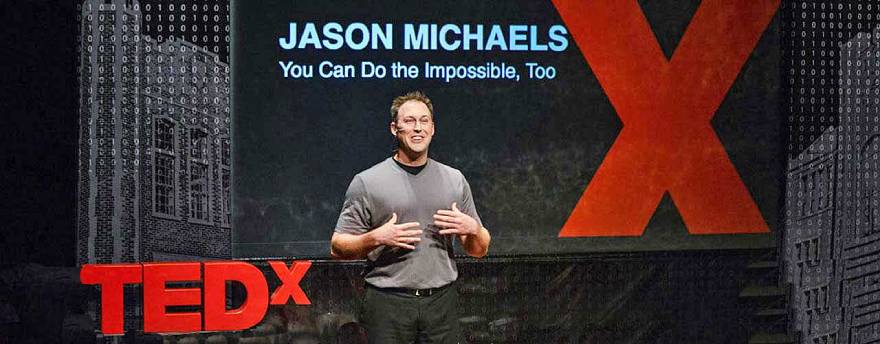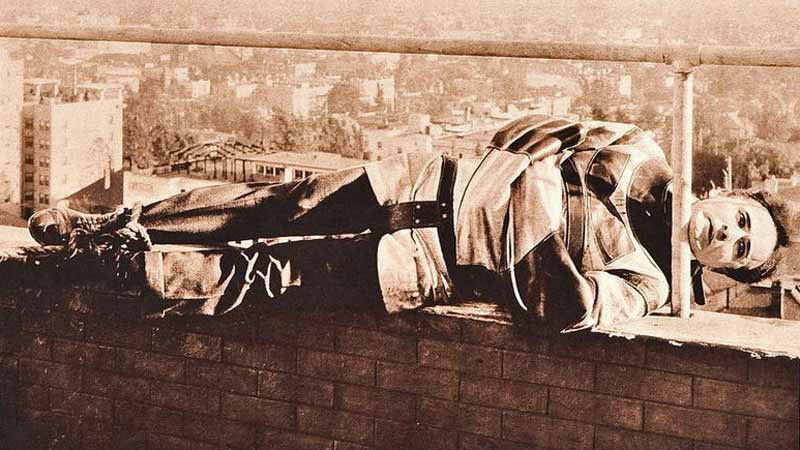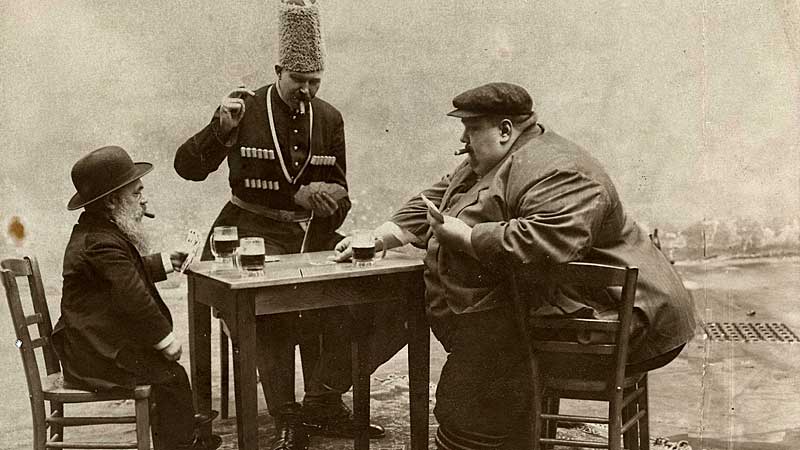Jason Michaels' "How to Get Hired at a Magic Venue" Podcast Interview
by Christian Painter and Roland Sarlot

What We'll Explore
Entertainment Director and Booking Agent Jason Michaels will share his experience on how to get hired at a magic venue such as the Magic Castle, House of Cards, or the Chicago Magic Lounge, what the magician is paid to do, knowing your audience, the fine line working with hecklers, and how to get hired back year after year.
Who is Jason Michaels?
Jason started his career working for veteran illusionist Brett Daniels. After a few years, he created his one man show Card Shark in which he still performs in multiple theaters across the US. In addition, he has a full stage illusion show that he tours in Europe with Armed Forces Entertainment. He has written a book about overcoming obstacles and regularly delivers keynote speeches. Jason was the entertainment director for the multi-million dollar Nashville magic speakeasy called The House of Cards. It is THE magic venue in the South East, United States where he literally wrote the handbook on hiring magicians for that venue.
Running Time:
The following interview has been edited and condensed for clarity.
What you can do
You are welcome to share up to 500 words of the below transcript in a non-commercial purpose provided you credit and link back to our site like this: "The Magic Oracle Business Podcast".
The Interview
Jason Michaels: If you’re a magician and you’re going to work a place like the House of Cards, or the Magic Castle, or the Chicago Magic lounge or whatever, I always think back to when I first started working the college market because what I was told was it’s a marathon, not a sprint. Don’t use a magic venue as a place to get your stage time. Use a magic venue as a place to build a relationship so you can book that venue every single year. If they play the long game, and they treat it like a marathon, it’s about building relationships with the entertainment director. That’s how you win the long game.
Christian Painter: Welcome to the Magic Business Podcast where we share insightful and delightful inner secrets about the business of magic. Here, magic professionals present their real-life experiences and most guarded secrets to help you further your career in the magical arts. I’m your host Christian Painter in partnership with the Magic Oracle Club where you can hear all of our magical business podcasts. Now, let’s dive in and explore some of those business secrets.
Today we meet Jason Michaels. He started his career working for Brett Daniels. After that, he created his one man show called Card Shark which he has performed in multiple theaters across the US. He has a full stage illusion show that tours Europe with Armed Forces Entertainment. He has written a book about overcoming obstacles and he does keynote speaking. Jason was the entertainment director for the multi-million dollar Nashville magic speakeasy called The House of Cards. It is THE magic venue in the South East where he literally wrote the handbook on hiring magicians for that venue. Jason, welcome to the show.
Jason Michaels: Thanks for having me on. This should be a fun conversation.
Christian Painter: We’re going to have a blast. Full disclosure, we actually know each other very well but what we want to talk about in particular, because you’ve shared with me your observations of hiring people at the House of Cards, the first thing I think we should explain is what the House of Cards is in Nashville?
Jason Michaels: Bare bones what it is, is a fine dining restaurant. It is excellent food, wonderful meals, and craft cocktails. It has a magic theme, it’s a magic venue, it is a genuine magic venue and it’s like almost walking into a magic museum.
Christian Painter: The venue, at least at the time, you had two close up performers, but not in a typical way, right? They weren’t going to the table to perform?
Jason Michaels: We had two close-up stations, ultimately there were three performers. There were always going to be two stations that people could walk up to at any time of the night and experience magic and that required having one magician in each of the two stations and then having another magician to float between the two stations so that everybody would have enough time to take a break. So that it wasn’t just non-stop magic, but a full night of magic. The House of Cards would start at like 5:30 in the evening and last until 11:30. So it was 6 hours total doing close up magic but you had a 20-minute long break every hour. So it’s only four hours of actual magic. But there were three different performers and the idea there, like I said, is that any of the guests could come and experience close up magic at any time.
Christian Painter: Ok, now let’s get to some of the meat which is what we want to talk about and that is when people want to work in this kind of venue and you had put out “I am ready to have guest performers come in," there’s challenges to that, wasn’t there?
Jason Michaels: Challenges that have to be overcome. I think the biggest thing that most magicians did, or maybe do not realize, is what the identity of the House of Cards was. House of Cards was and is a fine dining establishment and the idea of the place is magic, but the way that the magicians get paid is by selling food and beverage. So the magicians always have to understand that magic is imperative because that is the identity, that magic is massively important. But, even though the magic is important, they have to realize that flexibility is key, you know, being able to make adjustments. Not all magicians were easily flexible.
A couple of things to take into consideration, when food and beverage is being served, the magician didn’t think to themselves, that sometimes, when you have bartenders who are making incredible handmade craft cocktails that means sometimes people drink too much. Magicians have to be ready and able to handle people who might be spending a huge amount of money with the establishment, who might come in and act like a heckler. So the thing that I always kind of watch for is how the magician handles that. Are they able to handle that?
And you know, if you’re a magician and you’re thinking about going to work in a place where it’s a magic venue that serves alcohol, how are you gonna handle the heckler? It’s one thing to say “Well I just take care of the heckler myself!" But you gotta stop and think about that. If you have a place where somebody can buy a bottle of wine that costs $1,500 do you think it’s ok to just nail it with a couple of heckler lines or just put them down because they might be getting a little rowdy in your show? Because I can assure you that that may not be necessarily the right way to handle it. The magicians are always paramount and are always important but it is also important to keep into consideration that there is a way to handle people in these types of circumstances. So the first thing that magicians might not realize, that they just have to keep in mind, that people might be drinking too much.
Christian Painter: So what I’m hearing from you is this… This is a challenging environment and it probably takes magicians who have experience, and aside from being really good, to match the environment that they’re in and also have that ability and that experience to roll. How are you able to look at the people who want to apply to come there to determine, you know, this is gonna be a good fit and this someone might not?
Jason Michaels: Well, there are so many different ways. Sometimes it was about reputation, you knew someone by reputation. Or perhaps, I‘ve been in magic so long, I may have seen them or seen their acts somewhere and know they would be a good fit.
For the resident magicians, we had auditions and we would have people constantly come in and audition. Before the restaurant opened, I watched multiple people audition and so we would find people that I knew had the skills and then just understand them. Usually, it took just a little bit of time to get comfortable in that space. Just because it’s a unique space and it’s not quite like every other type of… In fact, it’s nothing like any other type of a restaurant, we can’t look at it like that at all.
It’s funny because people would sometimes send me links to their website, and my thought was always “Why are you just sending me a link to your website?" That was never the proper thing because of the idea that I was going to convince myself that they were the right fit just because they sent me a link to their website? Now I guess what they thought I was going to do is, I was gonna go look at their website and search through their videos and find what I needed to find in order to hire them, when in reality there are far better ways to go about doing that. You know, sending me promotional videos, sending me performance videos, sending me a photo, maybe a bio, you know, congratulating me on the success of the House of Cards and asking me what they needed to send me would have been an excellent approach. Just a simple email. Just say “Hey, what are your audition requirements, what are the requirements for being considered?" Something as simple as that would have been an excellent way to reach out. So I hired people based on what I saw because the magic audiences are very savvy and very smart and a lot of times magicians thought that their magic was deceptive. And I could watch an audience, and I thought to myself “This one [audience] isn’t deceived or impressed by this at all." And so we have to have really good magicians.
Christian Painter: That was really interesting because I think you’re right and a lot of people think “Well I’m just going to send you a link to my website and you’re gonna see how great I am." I think you really have a great point at saying, “Communicate with me, just don’t send me your website and think that I’m gonna think you’re great."
Jason Michaels: It was as simple as this. They just miscalculated how much time I have in a day. How many times people send information and how much time I was being in the House of Cards entertaining, doing management stuff, managing the magicians, making sure everything was set up and correct and there were no issues and everybody was prepared. Which means when it is time for me to look at the material, I don’t need to be trying to like... searching around. What I needed is the quickest and easiest thing. I need for somebody to send me a link that shows me exactly what I need to know. Boom! Okay, there you go. I like what I see, I can bring this person in or I’m willing to take it to the next level with this person and maybe ask him for more information.
Christian Painter: Well, what are some of the things some people did that were great and that was the right way to do it?
Jason Michaels: So I had one guy who sent me an electronic press kit, and originally I was like, “Oh really I have to look at this electronic press kit?" But it was so good, it was so well done. It was obviously designed by a professional graphic designer, the entire press kit was unbelievable! It looked like he spent some serious money on it, and it grabbed my attention. Because I was like, “This is somebody who is serious." And they must be working to spend this kind of money on this press kit and it looked wonderful. And as much as I hate to say it, because I usually like to say I have to see a performance video and usually that is the case, because I have to see the performance video. But this electronic press kit was so good, and the references were so good, all these different cruise lines and all these different theatres and stuff like that, it just made me say, “Okay, this person’s got it." They know the game and they’re serious and I can trust this person to come in just based on just how good the material was. You know, if you stop and think about it Christian, in the magic business we don’t have a lot to invest in. You don’t have to lease a building, you don’t have to buy a bunch of office furniture or necessarily even get people or hire office staff. So if you spend some money, even if you think it’s a lot of money on your materials so that you show up really really well to a potential booker, it’s a small price to pay compared to what normal businesses cost to run.
Christian Painter: I agree 100%, I think we spend so much time on the magic that we don’t concentrate on the business side of it. You know we do it at a very minimally, like you said “Oh here’s my website, just go find what you need." And we don’t realize that that’s not a good way to approach you. Now, you actually have a course on this because all of the headaches you say that you went through that year and you said “Wow, these magicians need a course, they need something to help them." Is that correct?
Jason Michaels: I do, I created a course. I basically saved all the information that people sent me and I went back and I looked at it and I started making notes. As I was the entertainment director throughout that year, I was making notes on things people were doing right and things people were doing wrong. There were a couple of things, for instance, I’ll tell you one technique two different people did and they both had this one technique that I teach in the course that they were able to get booked two different bookings on one phone call! So they were able to use this technique, I’ll tell you the technique because it’s very clever. I asked them about a specific date and they said, “I don’t know that I can make that date work but I can make this other date work." And I looked at my calendar and I said, “Okay, I can make that day work, let’s go ahead and lock that in." And then they said, “Hey, you know what, I’m looking at that original date you sent me, I can make that work too, let’s just go ahead and book them both." You know what that did? That actually forced me to book them and I did. I actually booked these guys that did this for two different weeks because I had originally called about the first week and that’s what I wanted to be filled. But then they transitioned me over to the second, “Hey, I can do this the other week." And then I said yes to that. And then they said, “Well I got that first week available." I already said that I wanted them to book in the first week, and now I book them for the second week, and then I was just like, “Ok, let’s just go ahead and book it." Because, like I already said, I wanted to book them and so with one phone call, they booked two completely separate bookings with me and it was a great technique. So, I talked about some stuff like that in the course.
Christian Painter: That’s very clever, I like that. Give me something that is a big mistake that people just seem to making over and over?
Jason Michaels: So if you’re a magician, and you’re going to work in a place like House of Cards, the Magic Castle or Chicago Magic Lounge, or whatever... In my mind, I always think back to when I first started working in the college market. Because what I was told when I first started working in the college market in the early 2000s was... this is a marathon, not a sprint. It takes time. The point was that you have to play the long game. And what I see a lot of people do is, they’re so excited or I don’t know if they just need the work so badly or whatever the situation is but, they get in their own way by trying to get booked too early in the process. Don’t use a magic venue as a place to get your stage time. Use a magic venue as a place to build a relationship with so that you can book that venue every single year.
Realistically, let’s say they’re in the business for 30 years, and let’s say that the venue is in the business for 30 years. They should be able to book that venue every year for 30 years if they do it right. If they play the long game and they treat it like a marathon. It’s about building relationships with the entertainment director and genuinely being a solution to the venue’s problems. Every venue has problems, instead of being a problem, be the solution to the venue’s problem. So that if the manager comes up to you and says, “I know we have scheduled you for four shows but we have an extra group in here and some stuff got out of hand. Is there any way you could just go over to their table and pay attention to them for 10 minutes and make them feel special?" Instead of saying, “Hey, I’ve already done my four shows," why don’t you say, “I would be happy to do that because that’s why I’m here." Finding a way to be a solution to the venue’s problem so that the management goes, “This guy, this girl, this act was unbelievable. We want them back," that’s how you win the long game.
Christian Painter: Waiting until you’re ready, that’s a great piece of advice. I remember one individual you hired that you told me about, who, even before you hired them, was already giving you problems of what he expected before he got there. I don’t know if you remember that one in particular but you we’re already pulling your hair out and this guy hadn’t even showed up yet
Jason Michaels: Yes, I mean, I can’t build a good relationship with somebody if you’re the type who acts like that. I understand that there are technical needs when you’re a magic act, that you have to make sure your technical needs are met. But you also have to take into consideration what the venue is and what you can do for the venue. And so do your research, and literally just by asking, “Hey, can I do this? Is this gonna work?" Instead of making, “Oh I have to have this." I mean, it sounds like, I’m not respecting the magicians at all, I just think it’s important when you’re a magician and you’re working magician and you want to be a working magician, I think it’s important to always take into consideration where you’re going and what and how you need to be best prepared to work in that type of setting.
Christian Painter: So, as we are ready to end this session, I wonder if you might have something you can share with us that would be “money in your pocket" so to speak, something where you’re going, “This is it. This is gonna be money for you if you do this."
Jason Michaels: Probably, I just may have said it a minute ago when I said, “Keep in mind who the audience is." Because if you keep in mind who the audience is… there are some people who believe that you just do your act no matter what, and I appreciate that artistic point of view, but the simple fact of the matter is... magic for most of the time breaks that fourth wall and it is interactive and people get to be involved. So making sure you know who that audience is and so that you are bringing them something that is going to really give them a wonderful experience. I heard it said one time where the person said, “The type of show you should do is... you should go from what the audience is expecting to the slightly unknown. Where maybe they heard about this stuff and you’re introducing new ideas to them. So, they start off where they are and then you start to bring them into your world and then you start with the going to the slightly unknown, and then you end in the complete unknown. So you take them somewhere that they didn’t know they were gonna go at all. But you can’t start in the unknown because they’re starting at a specific point of reference. And they have an idea of what magic is based on the venue and based on the way that the whole experience has been sold. So meet them where they are and then take them where you want them to go.
Christian Painter: Wow, that is nice! Nicely said, I really like that! Alright, I wanna get back to your course real quick because there are many people who need that, especially those starting out. It’s true, I think one of the things that you talked about was, and I think it is the fault of, “Here’s my website." They don’t think that there’s a whole relationship thing that you have to go through. There are questions that they should be asking. I think a course like this is absolutely something they need and before they buy their next magic trick, if they want to become professionals, if they want to be hired, they need to spend money on this other part of their career. Right?
Jason Michaels: Well, I mean I’ve always spent money on education. Whether it’s educating myself on the magic business. It’s absolutely imperative, and I would just say again that it’s not that expensive when you look at the cost of doing business, of an actual real business. If you buy a course that is a couple of hundred dollars, or even if you buy a course that is a couple of thousand dollars, if you consider what you can learn about the market that you’re wanting to go into and how much money you can make over the course of your career, you’re talking about shortening the learning curve massively and making sure that you’re totally prepared and spending a little bit of money that will be recouped quickly. So yeah, I’m with you, I think that this type of thing is worth having and I know different people who have different courses out there and some of these courses are truly excellent. If you want to work with those types of people, if you want to work in those types of venues you’d be crazy not to invest in those courses. My course is called Secrets of Booking Agents and Entertainment Directors and that’s the whole point of the course. It is almost solely about techniques, tools, tricks that you can use, and I say tricks very loosely because you’re not actually tricking anybody, but techniques and tools you can use to build a relationship with the booking agent or with an entertainment director that you will be able to have that relationship over the entire course of your career.
Christian Painter: Okay, so tell is how, where do we go?
Jason Michaels: So, secretsofbookingagents.com.
Christian Painter: Alright, I think that’s pretty straightforward. It’s kind of like the Magic Business Podcast, you know exactly what we’re getting and where we’re going, that’s fantastic! Jason, thank you very much for sharing with us today and helping to develop those younger performers out there who are looking into making this a profession.
Jason Michaels: Absolutely! Well thanks, more people need to be talking about this because there are a lot of people, a lot of folks who would love to be doing this as a business even if it were just a part-time business. So thanks for helping get the word out and helping people become more and more professional.
Christian Painter: Thank you for listening to our Magic Business Podcast. Please visit the Magic Oracle Club where you can hear all of our magical business podcasts and enjoy a vast array of additional magical knowledge. Until next time, remember... success is never owned, it’s only rented, and the rent is due every day.
A Jolly Genie?

The Magic Oracle is a FREE site but I still must pay dastardly server fees! Please, donate ANY amount... $1, $5, $10, why not $1 million?
THANK YOU for keeping magic alive... and me, a Jolly Genie!



